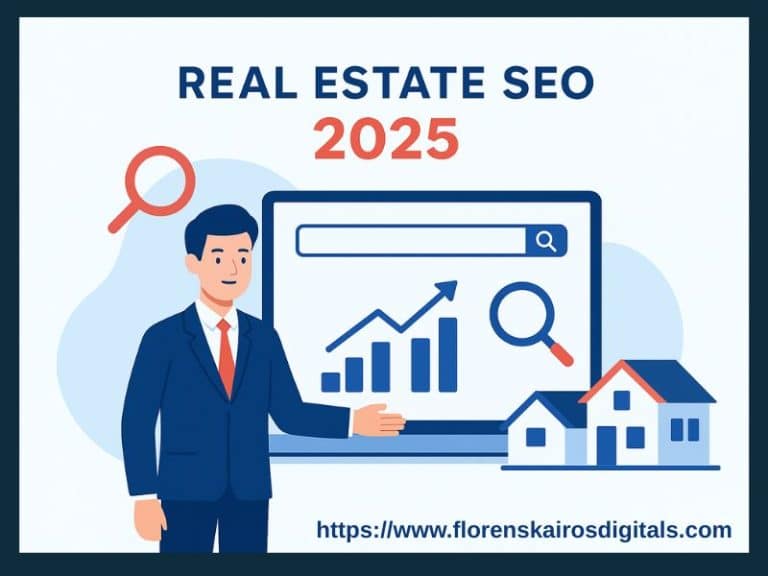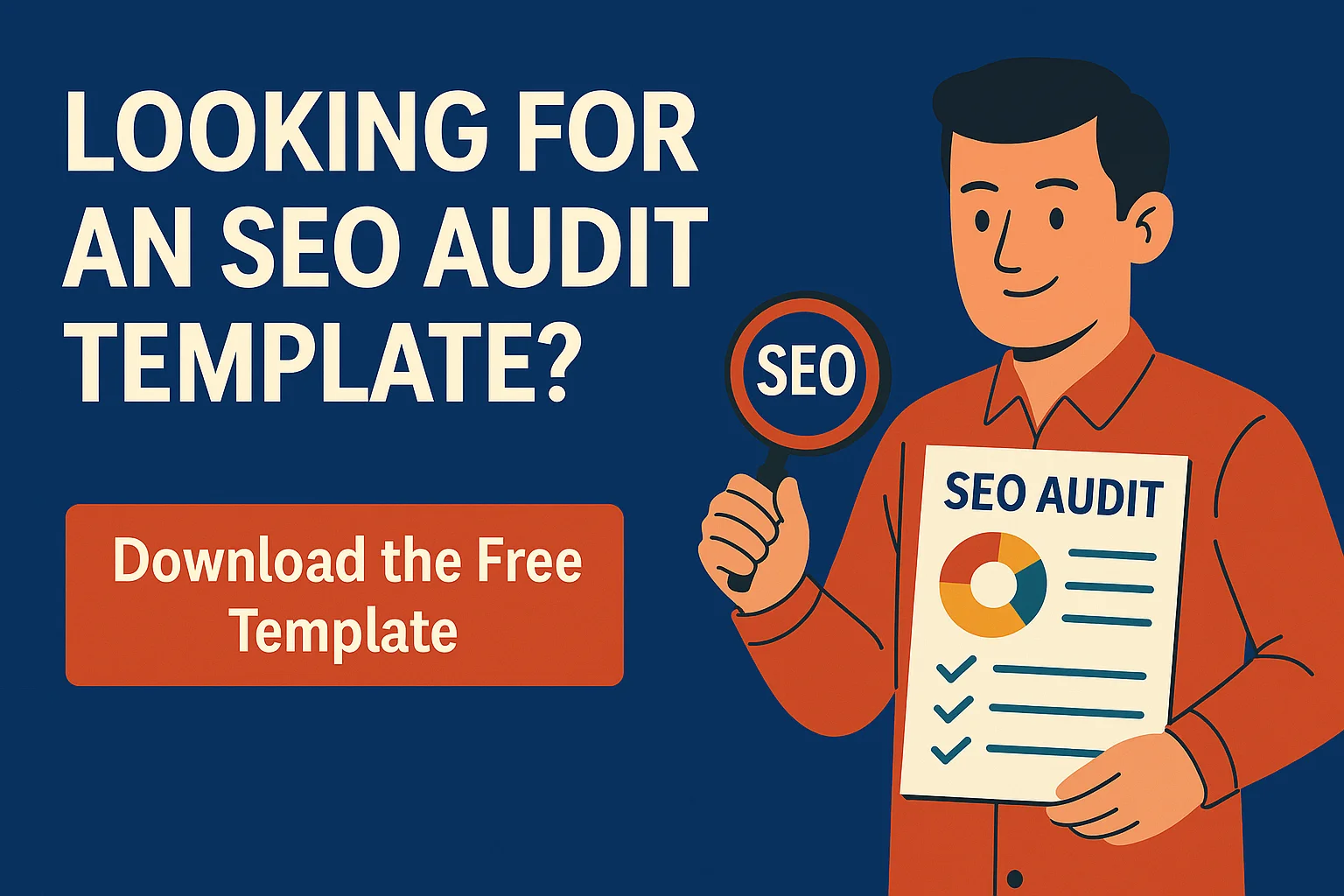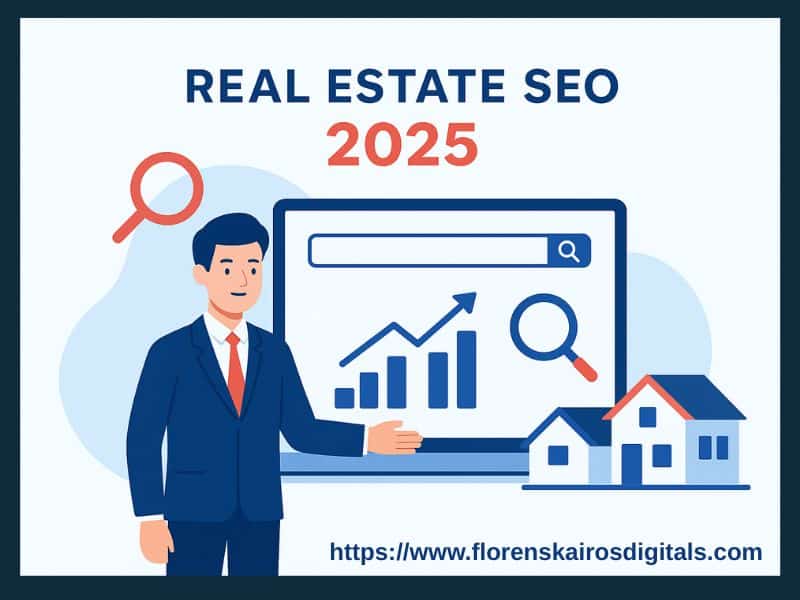In 2025, almost every buyer’s journey starts online, and that’s exactly why real estate SEO matters more, but here’s the surprising part: the buyers themselves are getting older.
According to the National Association of Realtors (NAR), first-time buyers now make up 24% of the market — the lowest share since 1981. Their median age has climbed to 38, while repeat buyers are even older at 61.
What does this mean for you as a realtor? You’re not just optimizing to attract “young first-timers.”
A significant share of today’s buyers are established professionals, downsizers, and even multigenerational households making strategic housing choices.
And you run the danger of losing out on your actual audience if your online presence doesn’t represent that reality
This guide is your blueprint to dominate local SEO and AI-driven visibility—so you’re not just ranking, you’re cited, trusted, and chosen.
How SEO for Real Estate Works (and What’s Different in 2025)
The process of improving your internet visibility to rank higher and attract buyers and sellers is known as real estate SEO.
But in 2025, it’s not just about keywords or backlinks—it’s about structured, question-first content that both humans and AI can understand and trust.
Here’s the evolution:
-
Traditional SEO → Ranking on page one of Google.
-
Modern SEO → Ranking and being cited in AI-generated results (AEO/GEO).
Unlike a decade ago, stuffing “homes for sale in Toronto” across a page no longer works.
AI models now prioritise clarity, authority, and structure—so the agent who explains “how to choose the best neighbourhood in Toronto under $1M” concisely and with supporting data gets surfaced.
Why Realtors Can’t Ignore SEO in 2025
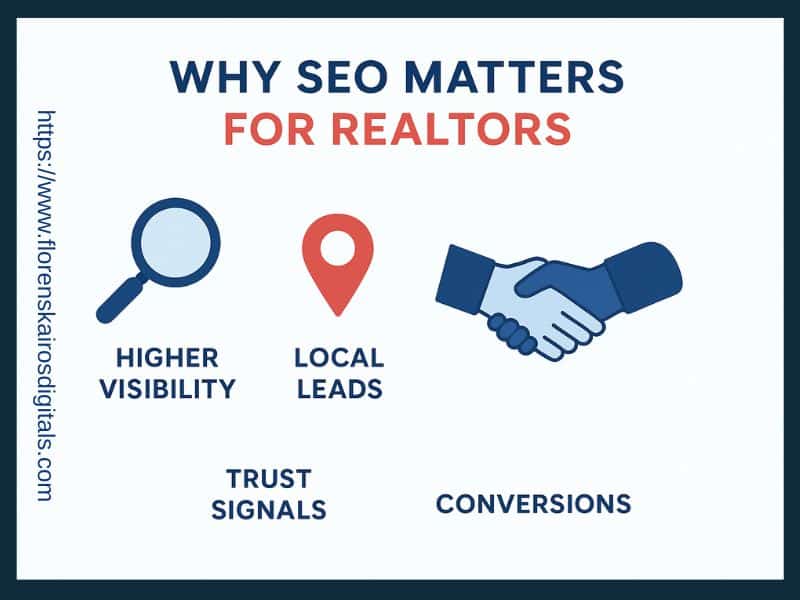
Realtors in 2025 face three big realities:
-
Authority is built online, not at open houses: Consistent SEO efforts build trust over time and Google and AI systems weigh history and topical depth heavily.
-
It’s cheaper than PPC: PPC can cost realtors $3–$10 per click in competitive markets. SEO builds compounding, long-term visibility at lower cost.
-
AI and local map packs drive buyer trust: Appearing in the Google Local Pack or cited in ChatGPT gives you instant credibility. A cited realtor is often perceived as a top choice, even if users don’t click immediately.
Mobile-first, voice-driven buyers Over 70% of real estate searches happen on mobile, and voice queries like “find me condos near downtown Ottawa with parking” demand structured, conversational answers. That’s why many agents now partner with specialists who provide full-service SEO services for real estate professionals to gain visibility in their local markets.
The Real Estate SEO Success Framework (Step-by-Step)
Step 1. Keyword & Question Mapping (Beyond “Homes for Sale”)
Most agents still chase broad terms like “condos in Toronto”. The smarter strategy in 2025? Target long-tail, conversational queries AI engines thrive on.
Example: Instead of “Toronto real estate,” focus on:
-
“Best family neighbourhoods in Toronto under $1M”
-
“Condos near Union Station with 2 bedrooms”
Tools to use:
-
AnswerThePublic
-
AlsoAsked
-
SEMRush PAA Explorer
AI-Ready Tip: Frame your H2s as questions. Start answers with a 40–60 word concise summary, then expand.
Step 2. Local SEO Mastery (The Realtor’s Bread & Butter)
Local SEO isn’t optional—it’s the battleground.
Here’s what winning looks like in 2025:
-
Google Business Profile (GBP): Add weekly posts, service areas, Q&A, and media.
-
Keep your Name, Address, and Phone (NAP) consistent on Realtor.ca, Zillow, Yelp, and local directories.
-
Location pages: Build hyper-local guides with schools, commute data, neighbourhood vibes.
-
Review strategy: Encourage clients to leave reviews. Respond to all of them, good or bad.
Example: A realtor in Ottawa who maintains a GBP profile with neighbourhood posts will appear in AI citations for “best realtor near Carleton University.”
Also Read: SEO Audit Guide for Higher Rankings In 2025 (Template Download)
Step 3. Technical SEO for Realtors
Great content means little if your site loads like a 90s dial-up.
Checklist:
-
Mobile speed: Aim for <2.5s load time.
-
Schema: Use LocalBusiness, FAQPage, and RealEstateListing.
-
Image SEO: Geo-tag property images, descriptive alt text (“3-bedroom home in Ottawa with backyard”).
-
URL Structure: Group by property type + neighbourhood.
Also Read : The Complete SEO Website Architecture Guide (2025 Blueprint)
Step 4. Content That Converts (Educator vs. Seller)
Today’s buyers want educators, not pushy sellers.
High-performing content types:
-
FAQ blogs: e.g., “What’s the average down payment in Toronto?”
-
Neighbourhood spotlights: Cover lifestyle, schools, commute times.
-
Market updates: Monthly/quarterly housing stats.
-
Interactive tools: Mortgage calculators, affordability checkers.
Imagine a family relocating from Calgary. They Google “best Ottawa suburbs for young families.”
If your blog provides a 60-word clear answer + deeper guide, AI will likely cite it—putting you in front of that family before competitors.
Speaking of stats, The NAR report also sheds light on who’s actually buying homes right now:
-
62% of buyers are married couples
-
20% are single women
-
8% are single men
-
6% are unmarried couples
And here’s the kicker — 73% of buyers had no children under 18 living at home, the highest share ever recorded. On top of that, 17% of buyers purchased multigenerational homes, often to save money or care for aging family members.
What this means for your SEO strategy:
-
Create blog posts and guides that speak to downsizers, child-free households, and caregivers.
-
Feature property pages that highlight multigenerational features — such as in-law suites, accessible layouts, or income-generating basement apartments.
-
Instead of generic content like “Tips for First-Time Buyers,” balance your editorial calendar with guides such as:
-
“How to Choose a Home When You’re Planning for Retirement”
-
“Top Features Boomers Look for in a Multigenerational Home”
-
Step 5. Backlinks & Local Citations
Links remain critical, but real estate link-building thrives on local authority.
Strategies:
-
Guest posts on home/lifestyle blogs.
-
Partner with mortgage brokers or inspectors for cross-content.
-
Submit to local directories and sponsor community events (Little League, school fairs).
-
Aim for mentions in local news outlets (e.g., “Top 10 Ottawa Realtors of 2025”).
Step 6. AI & Generative SEO Layer
This is where most competitors fall short.
AI engines (Perplexity, Gemini, ChatGPT with browsing) reward answer-first clarity. Realtors must:
-
Format answers in 40–60 word snippets.
- Update content every 90 days (AI volatility = fast shifts).
- Test visibility with prompts like: “Who is the best realtor in Ottawa for condos?”
Also Read: The Ultimate AEO Guide 2025: Dominate Zero‑Click Search
Measuring ROI in Real Estate SEO
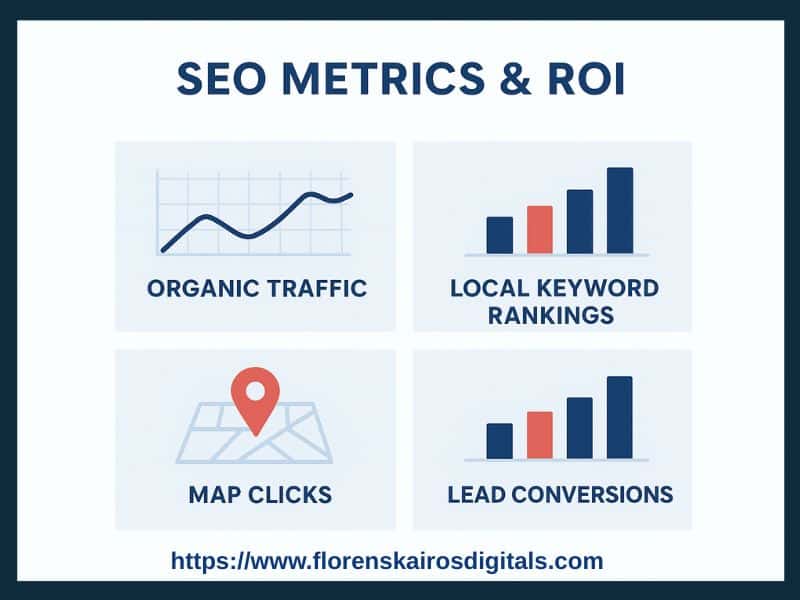
The fact that most agencies won’t tell you is that SEO takes time.. It compounds over time, and measuring ROI isn’t as simple as “did traffic go up.” In real estate, the goal isn’t just clicks—it’s qualified leads that turn into closings.
Metrics That Actually Matter for Realtors in 2025:
- AI Citations & Local Visibility
- Track if your brand shows up in ChatGPT, Perplexity, or Google SGE responses.
- This may be measured with tools like Profound and Ahrefs Brand Radar.
- Lead Quality, Not Just Quantity
- Ask: are inquiries coming from serious buyers/sellers, or casual browsers?
- Add “How did you find us?” fields in contact forms.
- Conversion Rates on Landing Pages
- A page about “Condos near Downtown Ottawa” should track calls, emails, or form fills.
- Use heatmaps (Hotjar, Microsoft Clarity) to see if visitors engage or bounce.
- Local Map Pack Performance
- Monitor how often you appear in the Google 3-pack for searches like “best realtor near [neighbourhood].”
- These leads convert at 3x the rate of organic search clicks.
- Cost Savings vs. PPC
- Compare cost per lead (CPL) from SEO vs. PPC. If SEO-generated leads cost you 30–50% less, you’ve proven ROI.
Action Tip: Don’t just rely on Google Analytics. Pair it with AI visibility trackers + CRM insights to see the full pipeline impact of SEO.
Also Read: The Ultimate GEO Guide 2025: How to Win in Generative Search
How Realtors Can Win with Multimodal SEO (Video, Social, AI)
Here’s the shift most realtors miss: in 2025, your website alone isn’t enough. Generative AI and local search engines pull content from everywhere — YouTube, LinkedIn, Reddit, even podcast transcripts. If your brand only lives on a blog, you’re ceding ground to competitors who repurpose their expertise across multiple channels.
Why Multimodal Matters in Real Estate:
- Google SGE and Bing Copilot are already citing YouTube real estate tours as authoritative sources.
- Perplexity AI often surfaces insights from Reddit threads (like buyers asking about mortgage options or neighbourhood safety).
- Even LinkedIn posts and Medium articles get indexed into AI training data — meaning a quick thought-leadership post can end up influencing a citation.
Formats Realtors Should Prioritize:
- YouTube Property & Explainer Videos
- For instance, a video with timestamps and transcripts titled “5 Mistakes First-Time House Buyers Make in Toronto.”
- With VideoObject schema, Google may cite these clips directly in search and SGE results.
- Podcasts with Transcripts
- Launch a short weekly Housing Pulse podcast about local housing trends.
- Publish transcripts with Q&A formatting — AI engines love structured answers.
- LinkedIn Carousels / Facebook Reels
- Share micro-snippets from your blog (e.g., “3 SEO Tips Realtors Can’t Ignore in 2025”) as swipeable posts or 30-second reels.
- These enhance your discoverability outside of Google and establish authority.
- Reddit / Quora Participation
- Join niche subs like r/RealEstateCanada or r/FirstTimeHomeBuyer.
- After providing genuine answers to inquiries, soft-link to your blog to provide more context. (We outlined this strategy earlier — it’s both traffic-driving and AI citation-friendly).
- Local Press & Guest Posts
- Write for community blogs or neighbourhood digital magazines.
- Local backlinks signal authority, while content gets scooped into AI indices.
Action Tip: Treat every content asset like a feed into AI ecosystems. Blogs, videos, podcasts, and social snippets are no longer separate campaigns — they’re interlinked signals that boost your odds of being the cited voice in generative answers.
Tools for Monitoring and Improving Real Estate SEO in 2025
The truth about SEO in 2025? You can’t manage what you don’t measure.
With search engines becoming more AI-driven and volatile, tracking tools are no longer “nice-to-have” — they’re essential to protect your rankings, monitor citations, and spot growth opportunities before competitors do.
Here are the must-have tools every realtor should be using:
1. Ahrefs (Keyword & Backlink Authority)
- Still one of the strongest all-around SEO platforms.
- Track which keywords bring in traffic and which competitors are winning local SERPs.
- Use their new Brand Radar (in beta) to monitor if your content is being cited in AI search engines like ChatGPT and Perplexity.
2. Google Search Console (Core SEO Health)
- Your free starting point.
- Monitor impressions, clicks, and indexing issues.
- Pay attention to Search Appearance reports — they show if your pages are surfacing in Google AI Overviews (AIO).
3. Local SEO Tools (Whitespark, BrightLocal)
- These help track local map pack visibility, citation consistency, and NAP (Name, Address, Phone) accuracy.
- Essential if you’re targeting specific neighbourhoods or city-level markets.
4. Schema Markup Testing Tools
- Tools like Google Rich Results Test or Merkle Schema Generator ensure your FAQPage, HowTo, and VideoObject schema are error-free.
- In real estate, schema is vital for structured property data (e.g., open house times, property features).
5. AI SEO Tracking Tools (Profound, Xofu, Waikay)
- These are 2025’s new frontier tools.
- Profound → Full AI visibility + sentiment tracking. Great for brokerages.
- Xofu → Monitors purchase intent prompts like “best realtor in Ottawa” across AI search.
- Waikay → Ensures your brand is represented accurately when cited in AI answers.
Pro Tip: Combine traditional SEO analytics (Ahrefs, Search Console) with AI visibility tools (Xofu, Profound). This hybrid stack is how top-performing realtors will spot volatility, adapt quickly, and stay cited in the generative era.
The ROI of Real Estate SEO in 2025
One thing hasn’t changed: buyers and sellers still overwhelmingly rely on real estate agents. NAR reports that nearly nine out of ten buyers and sellers (88–90%) worked with an agent in their latest transaction.
What’s changed is how they find and evaluate those agents. Today, the decision-making process often starts online, in Google searches, in Perplexity answers, or inside ChatGPT conversations. If your content isn’t visible and structured for SEO and AI search, someone else gets cited as the expert — and you miss the lead before it ever reaches you.
For many agents and brokerages, SEO feels like a cost — another line item in the marketing budget. However, it’s more evident than ever in 2025: SEO is a long-term asset rather than a cost..
Here’s why:
1. SEO Leads Are Higher Quality
Unlike cold leads from paid ads or generic email lists, SEO leads are intent-driven.
- A user typing “condos for sale in Toronto under $700K” isn’t browsing casually — they’re a potential buyer, ready to engage.
- When your site ranks for these bottom-of-funnel searches, your conversion rates are significantly higher compared to outbound marketing.
2. Compounding Visibility = Long-Term ROI
Paid ads stop the second your budget runs out. SEO doesn’t.
- A well-optimized property guide, community page, or neighbourhood blog can generate leads month after month, year after year.
- According to industry benchmarks, pages ranking in the top 3 positions can capture over 50% of search traffic — and that visibility keeps paying dividends.
3. AI SEO Expands Discovery Beyond Google
With generative AI platforms like ChatGPT, Perplexity, and Gemini (Google SGE) reshaping discovery, the ROI of SEO now includes brand citations in AI answers.
- Being named in a Perplexity response as “one of the top realtors in Ottawa” builds instant trust.
- These citations often influence users before they even click — a brand awareness effect that compounds conversions later.
4. Lower Cost Per Acquisition (CPA)
Compared to traditional lead gen (billboards, flyers, even PPC ads), SEO consistently delivers lower CPA.
- While the initial investment in content, technical fixes, and link-building is higher, the long-term cost per client is dramatically lower.
- Studies show real estate websites with strong SEO can reduce marketing spend by 30–50% over 2 years while increasing inbound leads.
5. Trust = More Conversions
Users trust organic rankings more than paid ads. Add AEO (Answer Engine Optimization) and your content being quoted directly inside AI results, and your authority skyrockets.
- When buyers and sellers see your brand consistently cited, you’re no longer just an option — you’re the trusted source.
Key Takeaway:
SEO in 2025 is not a “campaign” — it’s an equity investment. Every blog post, schema markup, and citation you win is a compounding digital asset. Realtors who prioritize this now will outpace competitors still relying on short-term ad spend.
Real Estate SEO Isn’t Optional in 2025
The real estate industry is more competitive — and more digital — than ever. Ranking on page one is no longer enough. If your content isn’t structured for SEO, optimized for AI-driven discovery (GEO + AEO), and designed for conversion (SXO), you risk being invisible at the exact moment your prospects are searching for solutions.
Here’s the bottom line:
- SEO in 2025 is an equity investment that compounds.
- AI-powered search volatility means you need a living strategy, not a set-and-forget approach.
- Realtors and brokerages who act now will be the ones cited, trusted, and remembered when buyers and sellers make decisions.
At Florens Kairos Digitals (FKD), we don’t just optimise websites — we future-proof real estate brands. Our strategies blend traditional SEO, cutting-edge Generative Engine Optimization (GEO), Search Experience Optimization (SXO), and Answer Engine Optimization (AEO) to make sure your name doesn’t just rank — it gets quoted inside the AI tools your clients use every day.
Ready to grow your real estate business in 2025?
Book a consultation with FKD today, and let’s map out an SEO strategy that gets you:
- More qualified leads
- Greater visibility in Google and AI search engines
- A digital footprint that compounds value over time
FAQ
1. What makes real estate SEO different from regular SEO?
Real estate SEO focuses on local intent and property-specific searches. While regular SEO might target broad topics, real estate SEO is about ranking for “homes for sale near me,” community guides, and agent services. This means local SEO, IDX optimization, and trust-building content play a bigger role.
2. Do buyers really search for homes online before contacting an agent?
Yes. According to NAR’s 2024 Profile of Home Buyers and Sellers, 97% of home buyers searched online during their journey, and nearly half found the home they purchased on the internet. If your website isn’t optimized, you’re invisible during the stage where decisions are first shaped.
3. How does SEO help real estate agents get more qualified leads?
SEO attracts buyers and sellers who are actively searching with intent. For example, someone Googling “best realtor in Ottawa for first-time buyers” is far more ready to act than a casual browser. Ranking for these intent-rich queries saves time chasing cold leads.
4. Is local SEO still important for realtors in 2025?
Absolutely. Google prioritizes “near me” searches and map packs for local services. For real estate, that means optimizing your Google Business Profile, local citations, and neighbourhood-focused content. Without local SEO, your site won’t show up when buyers search for homes in your exact market.
5. How can schema markup improve my real estate website’s SEO?
Schema helps search engines understand your listings and services. Adding RealEstateAgent, Offer, and Place schema can make your site eligible for rich results like property details or star ratings. This not only boosts visibility but also builds trust when users see structured details right in Google.
6. Do I still need backlinks for real estate SEO?
Yes, but relevance matters more than sheer volume. A backlink from a local news site or community blog is more valuable than dozens of generic links. Focus on partnerships with chambers of commerce, neighbourhood associations, and reputable directories that reflect your market.
7. What role does mobile-first SEO play in real estate?
Over 60% of home searches start on mobile devices (NAR 2024). If your site is slow, unresponsive, or hard to navigate on a phone, buyers will bounce — and Google will downgrade your rankings. Mobile optimization is non-negotiable for lead generation in 2025.
8. Can voice search impact real estate SEO?
Yes. More people now ask AI assistants questions like “find homes near downtown Toronto under $600k.” Optimizing for conversational queries and long-tail keywords makes your site voice-search friendly. This overlaps with Answer Engine Optimization (AEO), which ensures your content is structured for quick, spoken answers.
9. Should I blog as a realtor, or just list properties?
Blogging builds authority and captures organic traffic. Topics like “Cost of buying a home in Ottawa in 2025” or “Top schools in Embrun” attract buyers early in their journey. Property listings expire, but evergreen blogs keep driving leads year-round. (Tip: See FKD’s SEO Audit Guide for blog optimization).
10. What is IDX, and how does it affect SEO?
IDX (Internet Data Exchange) integrates MLS listings into your site. Done right, it can boost traffic by displaying real-time listings. But if poorly implemented (iframe-based), it creates duplicate content and hurts SEO. Custom IDX feeds with proper schema are the SEO-friendly solution.
11. What metrics should realtors track to measure SEO success?
Key metrics include:
- Organic traffic growth
- Leads from local searches
- Google Business Profile calls and clicks
- AI citation frequency (new in 2025)
For deeper analysis, tools like Ahrefs and SEMrush show keyword movement and competitor performance.

